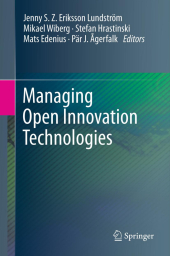 Neuerscheinungen 2014Stand: 2020-02-01 |
Schnellsuche
ISBN/Stichwort/Autor
|
Herderstraße 10
10625 Berlin
Tel.: 030 315 714 16
Fax 030 315 714 14
info@buchspektrum.de |

Mats Edenius, Jenny S. Z Eriksson Lundström, Pär J. gerfalk, Stefan Hrastinski, Mikael Wiberg
(Beteiligte)
Managing Open Innovation Technologies
Herausgegeben von Eriksson Lundström, Jenny S. Z.; Wiberg, Mikael; Hrastinski, Stefan; Edenius, Mats; gerfalk, Pär J.
2013. 2014. xvi, 300 S. 28 SW-Abb.,. 235 mm
Verlag/Jahr: SPRINGER, BERLIN; SPRINGER BERLIN HEIDELBERG 2014
ISBN: 3-642-44173-4 (3642441734)
Neue ISBN: 978-3-642-44173-8 (9783642441738)
Preis und Lieferzeit: Bitte klicken
This detailed analysis of the benefits of open innovation offers examples of best practice, real-life experiences from projects in businesses such as Nokia, and assessments of the challenges in, and solutions to, adopting open-innovation technologies.
Open innovation increases the profit of companies and organizations via the input and the adoption of new ideas that are transformed into new processes, products, and services. Yet, how do we ensure that adopters of such innovations focus on relevant problems and use appropriate methods? How should we manage open innovation technologies? How can we exploit distributed knowledge and inventions? And how can we promote them successfully on the market?
With valuable lessons to be learned from academic research and industrial experiences of e.g. Intel, Nokia, Philips Healthcare, small municipalities, e-learning platforms and user communities, this book focuses on some of the key dimensions of open innovation and open innovation technologies. It is divided into three themes: theme 1 deals with open innovation as it is in use today, including theoretical underpinnings and lessons from related research fields. Theme 2 analyzes the use of open innovation in organizations today in order to extract best practices. Theme 3 presents forward-looking theoretical research as well as practical future uses of open innovation. Each chapter addresses the particular topics by presenting experiences and results gained in real life projects and/or by empirical research, and clearly states its purpose and how readers are supposed to benefit from it.
Overall, the objectives of this book are to advance and disseminate research on systematic open innovation, and to make its results available to practitioners. Thus, the intended target audience includes the international academic community, industrial enterprises, and public authorities.
Managing Open Innovation Technologies - Contemporary Best Practices.- Theme I: Motivations.- Open Source Software as Open Innovation: Experiences from the Medical Domain.- "It´s the Conversation, Stupid!" Social Media Systems Design for Open Innovation Communities.- Organisational Participation in Open Innovation Communities.- Open Innovation Technologies and Exploitative and Explorative Learning.- Open Innovation in Inter-Organisational Networks in the IT Industry.- Theme II: Best Practices.- Encouraging Open Community Innovation: Outils-Réseaux´s Modular Approach.- Open Source Technology in Intra-Organisational Software Development -Private Markets or Local Libraries.- Open Innovation in Practice: The Development of the IT Capability Maturity Framework.- Voluntary Contributors in Open Innovation Processes.- Creating Value through Open Innovation in Social E-learning.- Theme III: Moving Forward.- Overcoming Industrial Inertia by Use of Open Innovation Technologies.- Using Information Technology to Manage Diverse Knowledge Sources in Open Innovation Processes.- Pico-Jobs as an Open Innovation Tool for Utilising Crowdsourcing.- Open Strengths and Weaknesses of IT User Innovation: Evidence from Three Cases.- Open Service Innovation in Health Care: What can we Learn from Open Innovation Communities?.- How Open is Open Innovation? Considering, Adapting and Adopting User Knowledge and Competence in the Solution Space.- The Future of Open Innovation Technologies and its Management.


